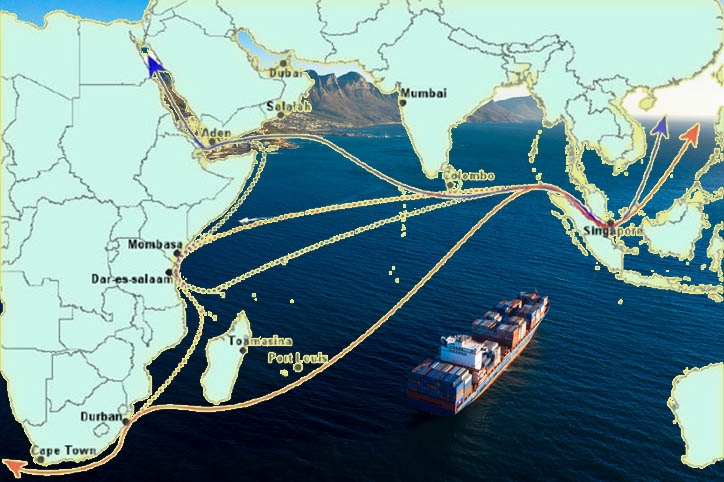
- As a major player in the Indian Ocean, it is imperative for India to navigating these changes judiciously to safeguard its national interests and uphold regional stability.
- Iran’s positive relations with Ethiopia could lead to direct trade and naval access, potentially altering the Bab al-Mandab Strait dynamics. Iran and China may seize opportunities for investments in the Red Sea.
- The UAE emerges as a key player, heavily financing Ethiopia and Somaliland, while also supplying armaments to the RSF and Marshal Haftar in Eastern Libya.
- Developments in the Red Sea and East Africa have far-reaching effects on the broader Indian Ocean region and India’s trade. These include influences on India’s maritime security, trade routes, strategic alliances, and resource competition.
The geopolitical landscape in the Red Sea and East Africa is undergoing significant shifts, as various actors assert their influence in a region that has traditionally been a focal point of strategic importance. Despite international attention on the Bab al-Mandab Strait due to Houthi attacks, Ethiopia and the United Arab Emirates (UAE) are making noteworthy moves with potential long-term consequences. Meanwhile, Egypt, a key player in the region, seems somewhat dormant in responding to these developments.
In Addis Ababa, Ethiopia’s capital, pivotal meetings have taken place. President Muse Bihi Abdi of Somaliland, a breakaway republic seeking recognition, met with Prime Minister Abiy Ahmed. They reached an agreement to provide landlocked Ethiopia with port access to the Red Sea. This development follows attempted reconciliation efforts mediated by the President of Djibouti between Somaliland and Somalia.
Another intriguing meeting involved Commander Dagalo of the Rapid Support Forces (RSF), a rebel group in Sudan. Dagalo, on a tour of East Africa, met with Deputy Prime Minister of Ethiopia, Demeke Mekonnen, and ex-Prime Minister of Sudan, Abdalla Hamdok. This tour was a strategic move by Dagalo to gain legitimacy through diplomatic engagements, potentially masking his true intentions behind peace talks. Notably, Eritrea is absent from Dagalo’s tour.
Relations between Ethiopia and Eritrea, former allies in the Tigrayan War, have soured. The border has been re-closed, and Ethiopian troops are reportedly positioned near the Eritrean capital, with Ethiopia expressing a desire to regain access to the Red Sea lost during the Eritrean War of Independence.
The UAE emerges as a key player, heavily financing Ethiopia and Somaliland, while also supplying armaments to the RSF and Marshal Haftar in Eastern Libya. This puts the UAE at odds with Egypt in certain spheres, despite cooperation with Libya.
Egypt faces a complex dilemma. Positioned in a volatile neighbourhood with an uneasy cold war with Ethiopia, Egypt risks losing its water supply to Ethiopia’s expanding influence. While Egypt’s allies such as Sudan, Eritrea, and Djibouti control Red Sea ports, Ethiopia’s strategic moves threaten to reshape the regional balance. Egypt must decide whether to respond promptly to Ethiopia’s actions or risk losing both its water supply and regional allies.
Trade routes, particularly the Red Sea and Suez Canal, are pivotal for global trade, including India’s maritime commerce. Any disruptions or shifts in control over these strategic waterways could disrupt the flow of goods, impacting India’s trade and energy security, given its reliance on oil shipments passing through these routes.
The historical diplomatic ties between India and nations in the East African and Red Sea regions highlight the need for strategic reassessment in response to changes in alliances or emerging power dynamics. Such shifts could necessitate a recalibration of partnerships to ensure the safeguarding of India’s interests.
The Red Sea region’s susceptibility to piracy and terrorism adds another layer of complexity. Political instability may exacerbate these security challenges, affecting India’s efforts to counter piracy and terrorism in the broader Indian Ocean.
The infusion of major powers into the Red Sea region may trigger heightened competition for resources and influence. This, in turn, could have economic implications for India, especially if resource-rich areas become contested or if economic partnerships undergo transformation.
In line with its policy of leading the Global South, India’s active diplomatic engagement with countries in East Africa and the Indian Ocean requires adaptation to changes in the geopolitical landscape. Maintaining stability and securing national interests in the region necessitates strategic flexibility in diplomatic approaches.
In summary, developments in the Red Sea and East Africa have far-reaching effects on the broader Indian Ocean region. These include influences on maritime security, trade routes, strategic alliances, and resource competition. As a major player in the Indian Ocean, India faces the imperative of navigating these changes judiciously to safeguard its national interests and uphold regional stability.
Looking ahead, Iran and China may seize opportunities for investments in the Red Sea. Iran’s positive relations with Ethiopia could lead to direct trade and naval access, potentially altering the Bab al-Mandab Strait dynamics. China, known for financing and constructing ports across Africa, may find itself in high demand to renovate future infrastructure in the region. The outcome of the unfolding geopolitical game hinges on whether Egypt and Ethiopia can find a resolution or if a new order emerges in an increasingly multipolar world.
(Aayush is a post-graduate student in International Relations at Kalinga University, Raipur. Views and opinions expressed are the author’s own)
Aayush Pal is a freelance writer on contemporary geopolitical developments. The views expressed in his work are entirely his own.

Wonderfully explain…nice jobe